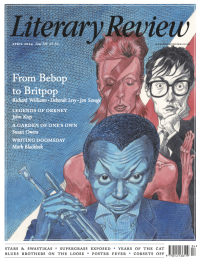Levi Roach
Hugh Do You Think You Are?
House of Lilies: The Dynasty that Made Medieval France
By Justine Firnhaber-Baker
Allen Lane 448pp £30
When Adalbero, archbishop of Rheims, stood up to speak at a gathering of the leading French magnates in Senlis in late May 987, all eyes were on him. Only a few weeks earlier, the young French king, Louis V, had died unexpectedly in a hunting accident, raising serious questions about the succession to the throne. Louis was no more than twenty-one at the time and had left no legitimate heir. The strongest biological claim lay with his paternal uncle, Charles of Lorraine. But Charles was duke of Lotharingia (alias Lorraine) within the neighbouring German realm, a situation which raised questions about his loyalty. He was also deeply unpopular among the ruling elite of France. This opened the door to another candidate: Hugh, duke of the Franks, the kingdom’s leading magnate, whose power base lay strategically between Orléans and Paris. Hugh numbered kings among his own ancestors and was champing at the bit for a chance such as this.
As France’s leading churchman, Adalbero had a special part to play in proceedings. His own loyalties were clear from the start. Adalbero had been at loggerheads with Louis at the time of the latter’s death and had little to win from the succession of Louis’s uncle. In the weeks following the king’s tragic accident, Adalbero had carefully stage-managed affairs to the maximum benefit of Hugh. He pre-empted an attempt by Charles to have himself declared Louis’s heir, insisting that the subject be considered at a general assembly of the kingdom’s great and good. He then arranged for this event to take place at Senlis, just north of Paris, a site conveniently within the sphere of influence of Hugh. Here, Adalbero’s first move was to contend that succession to the throne should be decided not by inheritance (or at least not by inheritance alone) but by suitability. He then went on to outline Charles’s failings, which were manifold and grievous: Charles was lethargic, beholden to a foreign monarch and – worst of all – married to a low-born woman. By every conceivable measure, Charles was unfit for office. In contrast, Hugh was a man renowned for his deeds, nobility and wealth – a reliable protector of the common weal. According to Adalbero, the choice was a stark one: ruin with Charles or glory with Hugh.
As had been the plan all along, those present quickly agreed to Hugh’s succession. Only a week later – a clear sign of undue haste – Hugh was formally crowned and consecrated at Noyon, with Adalbero presiding. At the time, few could have imagined that this would mark the start

Sign Up to our newsletter
Receive free articles, highlights from the archive, news, details of prizes, and much more.@Lit_Review
Follow Literary Review on Twitter
Twitter Feed
Under its longest-serving editor, Graydon Carter, Vanity Fair was that rare thing – a New York society magazine that published serious journalism.
@PeterPeteryork looks at what Carter got right.
Peter York - Deluxe Editions
Peter York: Deluxe Editions - When the Going Was Good: An Editor’s Adventures During the Last Golden Age of Magazines by Graydon Carter
literaryreview.co.uk
Henry James returned to America in 1904 with three objectives: to see his brother William, to deliver a series of lectures on Balzac, and to gather material for a pair of books about modern America.
Peter Rose follows James out west.
Peter Rose - The Restless Analyst
Peter Rose: The Restless Analyst - Henry James Comes Home: Rediscovering America in the Gilded Age by Peter Brooks...
literaryreview.co.uk
Vladimir Putin served his apprenticeship in the KGB toward the end of the Cold War, a period during which Western societies were infiltrated by so-called 'illegals'.
Piers Brendon examines how the culture of Soviet spycraft shaped his thinking.
Piers Brendon - Tinker, Tailor, Sleeper, Troll
Piers Brendon: Tinker, Tailor, Sleeper, Troll - The Illegals: Russia’s Most Audacious Spies and the Plot to Infiltrate the West by Shaun Walker
literaryreview.co.uk